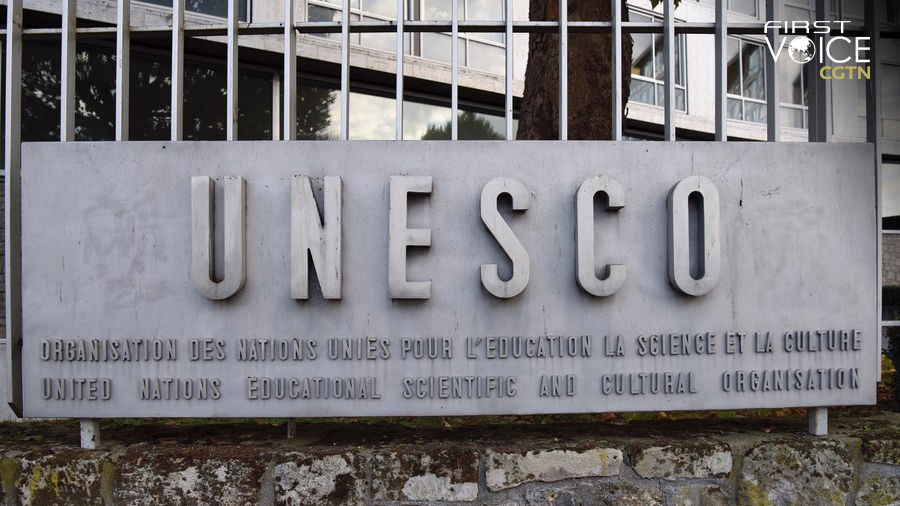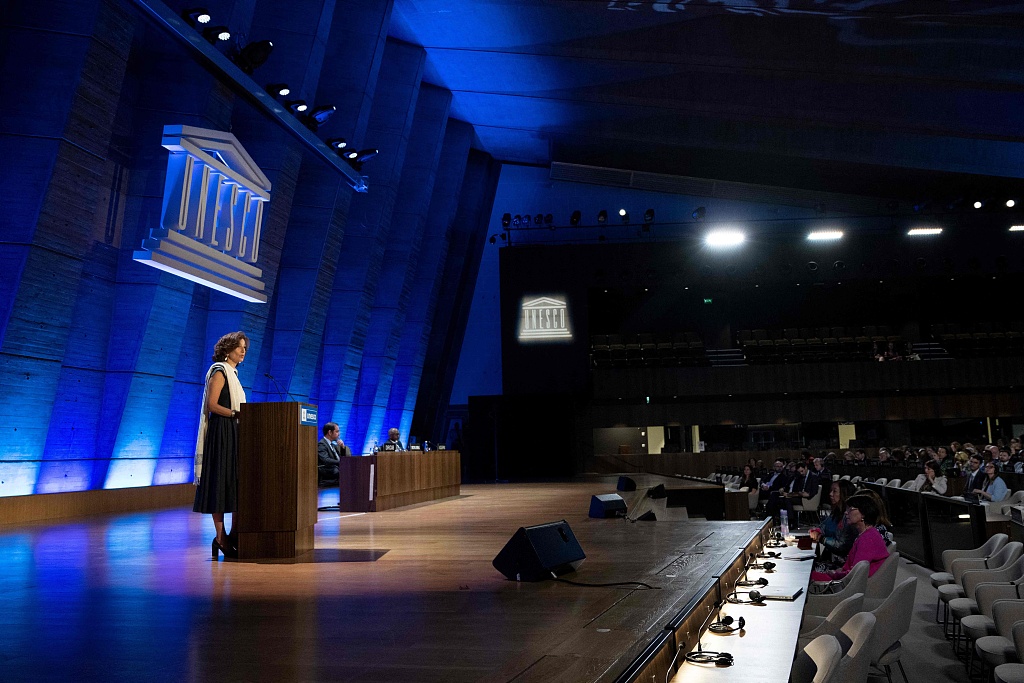
Editor's note: CGTN's First Voice provides instant commentary on breaking stories. The column clarifies emerging issues and better defines the news agenda, offering a Chinese perspective on the latest global events.
After nearly six years of absence, the United States is rejoining the United Nations Educational, Scientific and Cultural Organization (UNESCO). "This is a strong act of confidence, in UNESCO and in multilateralism," said UNESCO's director-general Audrey Azoulay.
That optimism would've been affirmed if it hasn't been already qualified by the reason for U.S.'s re-entry. In March, the U.S. Under Secretary of State for Management John R. Bass claimed that U.S.'s absence from the organization has strengthened China and "undercuts our (U.S.'s) ability to be as effective in promoting our vision of a free world... So if we're really serious about the digital-age competition with China, we can't afford to be absent any longer."
This isn't the first time U.S. treated UNESCO as its political playground. When it withdrew from the organization the first time in the 1980s, the motive originated in Cold War confrontation. The United States back then deemed the organization to be "corrupt" and "too susceptible" to the Soviet Union's influence, according to the New York Times's report. George W. Bush brought America back to UNESCO in 2002 to drive home his "message of readiness for effective international cooperation" in the lead-up to the Iraq war.
Under the Obama administration, American funding for UNESCO was stopped after the UN agency voted to include Palestine as a member state in 2011. Donald Trump took America out of the organization based on what his administration deemed as anti-Israel biases and management problems. Now, Biden is putting the U.S. back in there, ostensibly for "result of five years of work," but with "countering China" as the propeller for the re-entry.
Few international organizations have been treated with such disrespect for its core mission by its largest funder. Before leaving, the U.S. contributed 22 percent of UNESCO's funding. It has promised to pay more than $600 million in back dues. It is, no doubt, a welcoming news for an organization that suffered budget-cuts and program-slashing years before.

UNESCO Director-General Audrey Azoulay (L) delivers a speech to announce the United States' request to return to the institution, at the UNESCO headquarters in Paris, France, June 12, 2023. /CFP
UNESCO Director-General Audrey Azoulay (L) delivers a speech to announce the United States' request to return to the institution, at the UNESCO headquarters in Paris, France, June 12, 2023. /CFP
However, these back dues come with strings attached. They are the classic money-for-power scheme used to force one's will onto an organization. By reclaiming its place as the organization's top funder, the United States seeks to turn the organization into a mercenary, paving a smoother path for its anti-China agenda.
The timing of U.S.'s return is telling. Over the past several years, UNESCO became increasingly engaged in the global AI management. It had adopted a global recommendation on the ethics of AI in 2021, held the first ministerial meeting on the matter in 2022. Last month, UNESCO held the first global meeting of Ministers of Education to discuss responses to ChatGPT. And on the same day the announcement of U.S.'s return was made, UN Secretary-General Antonio Guterres said he's going to appoint a scientific advisory body soon including experts on artificial intelligence and that he is open to creating a new UN agency focusing on AI.
U.S. Secretary of State Anthony Blinken said in March that members of UNESCO "are working on rules, norms and standards for artificial intelligence. We want to be there," noting that "China right now is the single largest contributor to UNESCO. That carries a lot of weight. We're not even at the table."
The U.S. is back into UNESCO not because it wants to strengthen the organization. America wants to be back in because it believes China is taking the places that it deemed belonged to itself and wants to make sure China isn't supplanting its "leadership" position.
This is a reckless fight for power that the U.S. is seeking. It is endangering a neutral international organization by turning it into a political battlefield. More importantly, as AI rapidly grows, the world needs a set of rules governing it and this must be reached based on mutual respect and discussion. The process can't take place without the United States' participation, but it can't tolerate a U.S. barging in simply wanting to impose its will onto all others.
The United States needs to watch itself. Keep walking down the wrong path and it would devastate the organization that's trying to help secure the world’s future.
(If you want to contribute and have specific expertise, please contact us at opinions@cgtn.com. Follow @thouse_opinions on Twitter to discover the latest commentaries in the CGTN Opinion Section.)